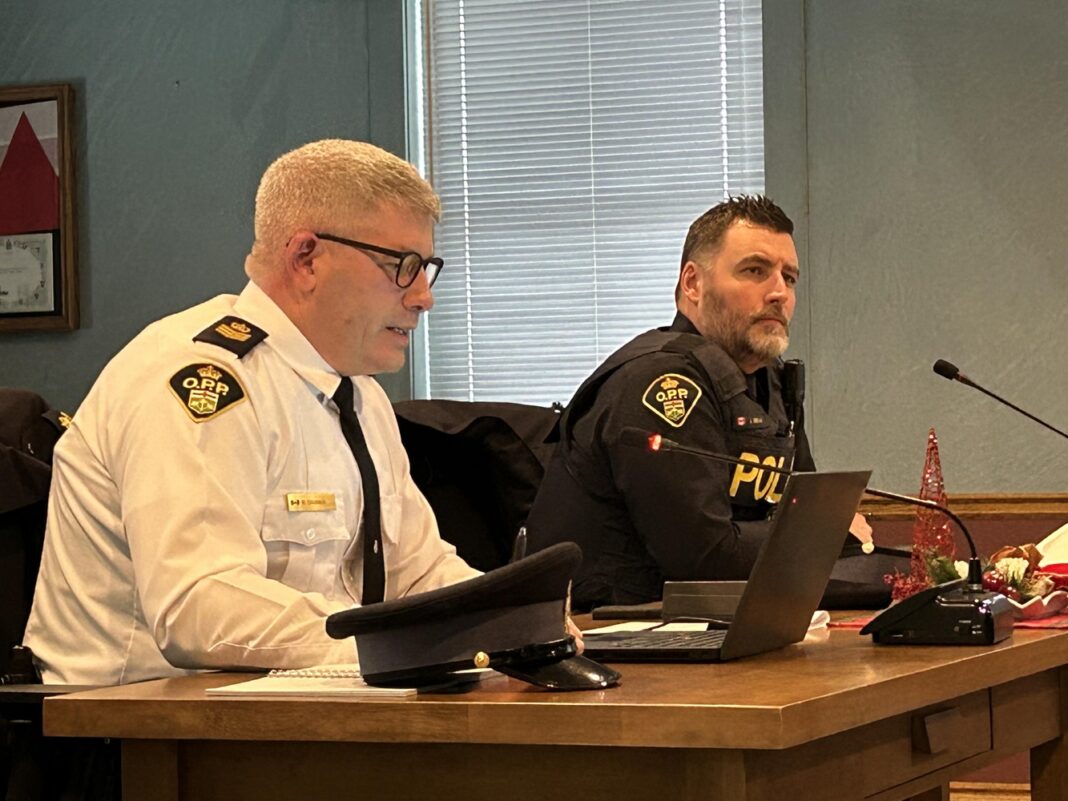Calls for service to the Haliburton Highlands OPP have dropped about seven per cent this year, though interim detachment commander, Mike Cavanagh, said there’s been a 15.7 per cent increase to the number of Criminal Code and Provincial Statute charges laid locally.
Addressing the inaugural meeting of the new Haliburton Highlands OPP detachment board Nov. 29, Cavanagh said statistics had dropped for violent and property-related crimes in 2024, with increases seen in Highway Traffic Act violations and drug enforcement.
The detachment has processed 3,279 complaints from Jan. 1 to Nov. 30 – down from 3,522 last year – with 139 violent crimes leading to charges, down from 178, and 318 property crime violations, down from 343.
Cavanagh said there has been one murder, 15 sexual offences, 63 assaults and firearms-related offences, and 19 cases of criminal harassment this year. For property crime, he reported 40 break and enters, 29 thefts over $5,000, 106 thefts under $5,000, 85 cases of fraud, and 53 cases of mischief and minor property damage.
Speeding has become a serious concern for police, with a 53.7 per cent increase to the number of tickets issued in 2023, Cavanagh said, up to 976 from 635 in 2023. The detachment issued 47 impaired driving charges, down from 70 last year, 17 seatbelt-related charges, and two distracted driving tickets.
Drug crime is up 300 per cent, Cavanagh said, with 16 charges compared to four last year. Eight of the charges were for possession of an illegal substance, with seven intent to traffic charges.
“The way drug trafficking works in this community, this is more of a consumption site. Drugs come in across the border, land in places like Ottawa and Toronto. The drugs get divided up and sold to other communities,” Cavanagh said. “Investigations involve a great number of hands to do – it’s not as simple as a traffic stop. We need court orders… to know when drugs and dealers are arriving… it’s a lot of work.”
He said fentanyl and methamphetamine are the two most common drugs distributed locally.
“The opioid epidemic is migrating everywhere in the province. We’re not immune to it,” Cavanagh said. “Being a little more remote, we won’t see real bad drug addicts stick around long because the supply isn’t as high as in big cities. If we pick up a dealer here, people lose access and so they’ll go to where the drugs are.
“We may see a consistent problem here, but with decreased supply people will migrate where they can get the drugs,” he added.
Board member Walt McKechnie said he felt the courts are too lenient when it comes to drugs, saying he believes every dealer caught selling dangerous substances should be charged with attempted murder. Chair, Andrew Fletcher, said the board can advocate for stricter legislation.
Cavanagh noted the detachment’s clearance rate, or percentage of crimes solved, is 74.1 per cent for violent, 18.2 per cent for property, 81.3 per cent for drugs, 82.6 per cent for driving offences, and 69 per cent for all other cases.
Officers spent 5,918 hours patrolling the community in cruisers, 180 marine hours on the water, 27 hours patrolling off-road – important, Cavanagh noted, with three ATV vehicle deaths in the area last year, the most in Ontario – and 197 hours on foot patrol.
“Part of our goal is to increase community service. I’ve only been here three months, but our officers are really taking more of a community-driven approach. We saw a positive response when we did Take Back the Night and the Remembrance Day service in Minden, so we want to do more,” Cavanagh said.
Board make up
The new board is comprised of seven members – four council representatives, two public appointees, and a provincial nominee. Algonquin Highlands mayor Liz Danielsen, Highlands East mayor Dave Burton and Minden Hills mayor Bob Carter are on it, so too Dysart deputy mayor McKechnie, with Fletcher and Andy Chvedukas public appointees, and Andrew Hodgson the provincial rep.
Board terms are typically four years – with turnover coming six months after municipal elections.
Meetings will run every other month, with a summer break. There are five proposed next year. It was decided members would be permitted to attend virtually if they can’t make it in-person. Meetings will run in the afternoon, from 1 to 4 p.m.
Live streaming may be a possibility, though the board wants to see what costs are involved before committing.





